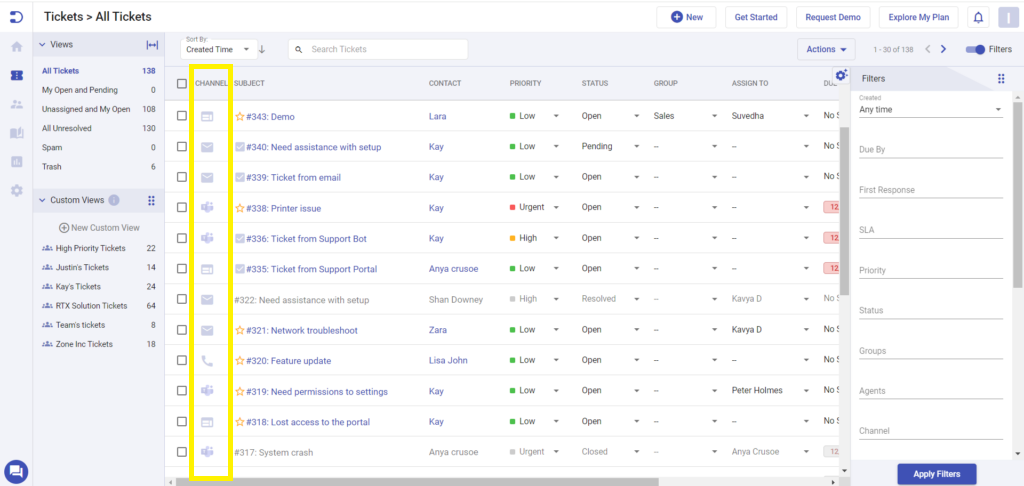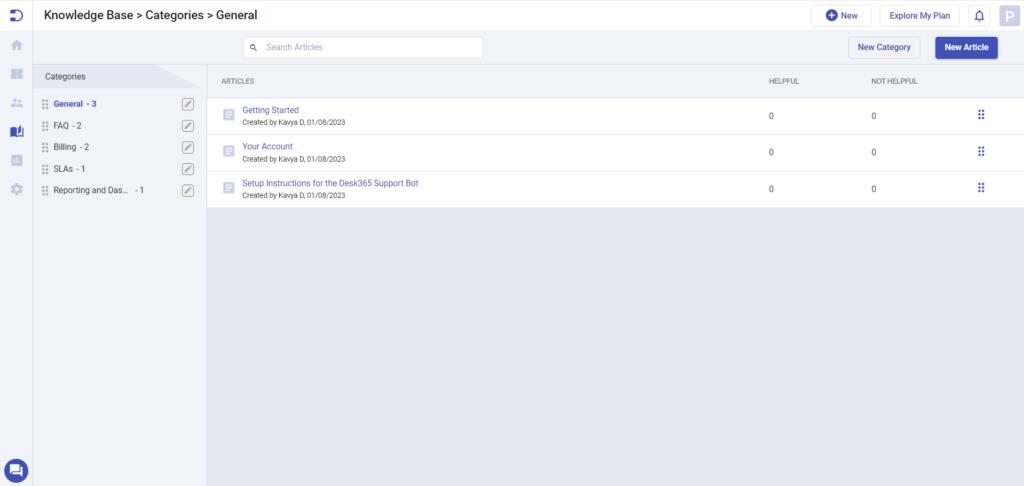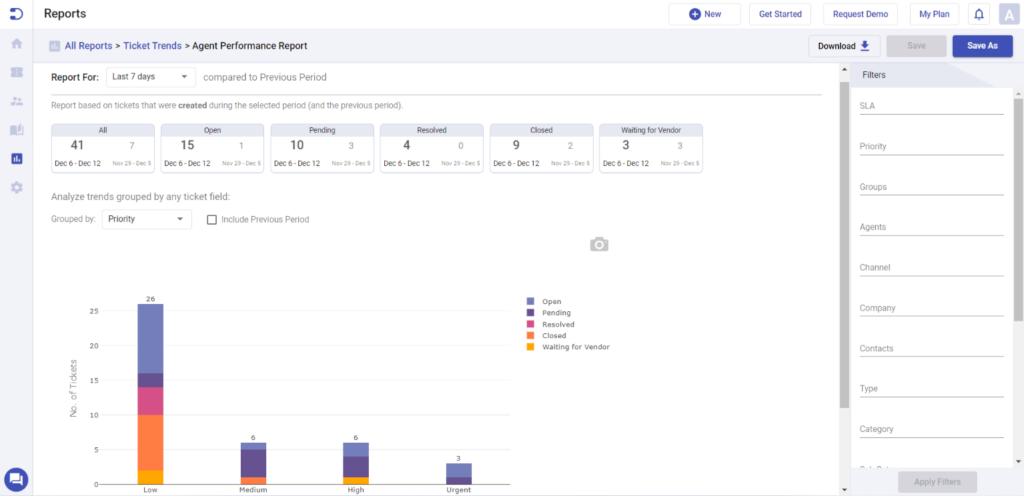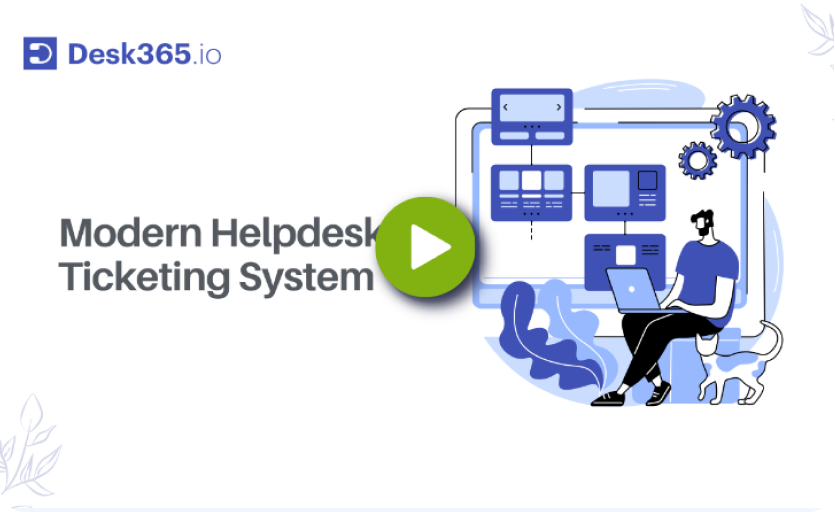Do you provide your customers with a great experience when they reach out for help? Is your customer service team helpful and reliable? Did you know that even just one good experience with customer service can make customers like your brand?
86% of buyers are willing to pay more for a great customer experience, but 32% will leave a brand they love after just one bad experience
This is one big reason why it’s so important to deliver great customer service if you want your business to do well over time.
Customers expect quick solutions when they seek customer service. Therefore, agents in a ticketing system must adhere to best practices to consistently deliver good customer service. When all agents in the helpdesk are aligned and proficient in prioritizing, responding to, and following up on tickets, it enhances the overall customer experience for your brand.
What is Good Customer Service?
Good customer service is vital for any successful business. Delivering good customer service involves offering quick and helpful support that improves customers’ overall experience. A helpdesk ticketing system is key to delivering good customer service.
Clear communication, smooth processes, advanced technology, and personalized assistance are crucial for providing good customer service. Companies that prioritize this can enjoy higher customer satisfaction, more loyal customers, and better retention rates. As retention rates rise, so does brand advocacy. Here are some stats highlighting the importance of retention rates.
Source: Outbound Engine
Why is Good Customer Service Important?
Good customer service is essential for any business, and its importance cannot be overstated. In today’s competitive market, it’s crucial for businesses to strive for excellence in customer service. Here’s how good customer service can benefit companies:
- Building a Positive Image: Good customer service creates a favorable impression of the company in the customer’s mind. When customers feel valued, they’re more likely to become loyal and recommend your business to others.
- Anticipating Customer Needs: It helps businesses understand and anticipate customer needs, allowing them to tailor their services accordingly. This leads to higher levels of customer satisfaction.
- Standing Out from Competitors: Providing excellent customer service sets your business apart from competitors, resulting in increased sales and a stronger market position.
Businesses that prioritize customer service management are more likely to thrive in today’s competitive marketplace.
What are the Principles of Good Customer Service?
- Understanding Customer Needs: This principle emphasizes the importance of actively listening to customers needs and expectations. By engaging in meaningful conversations, asking relevant questions, and demonstrating genuine interest in resolving their concerns, businesses can establish a strong foundation of trust and reliability. This not only enables the provision of effective solutions but also creates trust and reliability in the brand.
- Timely Assistance: Customers value prompt and accessible support when encountering issues or seeking assistance. Providing quick responses and ensuring availability across various communication channels, such as phone, support channel, email, etc., reflects a commitment to respecting customers’ time and addressing their needs promptly. Timely assistance not only satisfies customers but also reinforces their confidence in the brand’s dedication to customer satisfaction.
- Personalized Service: Recognizing that each customer is unique, personalized customer service involves understanding their specific preferences, and challenges. By tailoring solutions to meet their individual needs, businesses can enhance customer satisfaction and loyalty. This personalized approach demonstrates a genuine interest in building meaningful relationships with customers, fostering a deeper connection for the brand.
- Consistent Customer Service: Consistency is key to building trust and confidence in the quality of service provided. Customers expect a consistent experience each time they interact with a business, regardless of the channel or context. By delivering reliable and high-quality service consistently, businesses can establish a reputation for reliability and professionalism, strengthening relationships with customers over time and encouraging repeat business and referrals.
- Continuous Improvement: Recognizing that customer needs and expectations evolve over time, businesses must embrace a mindset of continuous improvement. Actively seeking feedback from customers, analyzing market trends, and learning from interactions enable businesses to identify areas for enhancement and innovation in their customer support processes. Regular training, performance reviews, and the adoption of new technologies are essential components of this principle, enabling businesses to adapt and evolve in response to changing customer preferences and market dynamics.
How a Ticketing System Can Improve Customer Service?
A ticketing system, also known as helpdesk software, is a valuable tool for improving customer service in businesses. It helps manage customer inquiries, organize tickets, prioritize tasks, track progress, and ensure timely resolution. Choosing a ticketing system with key features enhances the management of customer tickets.
Such a system enables businesses to handle inquiries promptly, reduce response times, prioritize issues based on urgency, notify users of ticket status, and ensure resolution. Agents benefit from a centralized platform to track and respond to tickets from various channels, boosting efficiency and ensuring no tickets are missed, thereby enhancing the overall customer experience.
Moreover, the ticketing system provides insights into customer trends and behavior, aiding in identifying common issues, and areas for improvement, and gauging customer satisfaction levels. These insights contribute to improving customer support, reducing churn rates, and fostering loyalty.
Streamlining internal processes and improving team communication are additional benefits of the ticketing system. It facilitates collaboration and information sharing among agents, reducing redundancies and ensuring all agents are up to date on customer requests.
By efficiently managing customer issues and internal workflows, businesses can deliver excellent customer service.
10 Ways to Deliver Good Customer Service
Quality helpdesk software can aid in delivering excellent customer service by simplifying processes and offering an effective means to manage tickets. However, it’s important to understand how good customer service is delivered. Here are 10 ways to achieve this:
1. Offer Support Across Multiple Channels
Customers choose communication channels based on their preferred speed of response or the complexity of their issue. Providing assistance through their preferred channel is one of the best ways to deliver excellent customer service. Businesses offering omnichannel support resolve tickets three times faster, cut down on customer waiting time by 75%, and manage a higher volume of tickets.

2. Be an Expert on Your Product
Agents handle customer queries all day, so it’s crucial for them to be product experts. They should have in-depth knowledge and be able to discuss features and troubleshoot any issues. A knowledge base facilitates collaboration among agents and enables them to deliver prompt, consistent service to customers.
Not just that customers don’t always prefer to ask for help; they often want to solve problems independently. However, only a few companies provide a knowledge base on their support portal, missing out on this opportunity. Creating a knowledge base enables customers to help themselves, improving customer service while also relieving pressure on the support team.

3. Encourage Agent Collaboration
Resolving customer tickets frequently involves agents collaborating with colleagues from other departments. Features like adding notes within the ticketing system and receiving notifications when a ticket is updated by another agent can enhance collaboration and ensure a positive customer experience.

4. Provide Prompt Responses
In online customer experience, respecting the user’s time is crucial. Resolving tickets swiftly is a key element of good customer service, especially for minor issues. While customers understand that complex problems may take time to solve, the speed of your response is what counts. Aim to reply to your customer as promptly as possible, but avoid rushing to close the ticket without addressing the issue thoroughly.
Recommended Read: How to Improve Customer Service Response Times?
5. Offer Personalized Service
Customers expect personalized service; they prefer human interaction over automated responses. Understanding the types of issues they typically encounter, their preferred communication channel and response time can help deliver a positive customer experience.
6. Establishing Ticket Categories and SLAs
Defining ticket categories and implementing a ticket escalation procedure are vital for efficiently managing customer tickets. Understanding common customer issues and categorizing them allows agents to identify and prioritize tickets effectively. The escalation procedure outlines steps for involving higher-level support when necessary. Keeping customers informed about their ticket status or any delays is essential for delivering excellent customer service.
Recommended Read: Ticket Escalation: What is it and how to use it effectively
7. Keep a Positive Attitude
Maintaining a positive attitude is crucial for providing great customer service. Since many interactions occur through helpdesk software rather than face-to-face, the language and tone used, reflect your attitude. Misinterpretations are common, and tickets can result in a negative customer experience. Don’t hesitate to use emojis to convey your message if a chat becomes tense.
8. Listen to your Customers
Pay attention to customer feedback. Show them that you are listening and trying to solve their problems. Repeating their problem in your own words shows that you’re actively listening. Tailor your response accordingly to address the specific situation.
9. Utilize Analytics
Utilizing analytics to track and analyze the performance of a helpdesk ticketing system is crucial for delivering good customer service. By examining metrics like first response time, resolution time, survey ratings, and more, businesses can gather valuable insights into the effectiveness of their helpdesk operations. This enables them to identify areas for improvement, recognize ticket trends, make strategic plans, allocate resources efficiently, and streamline operations.

10. Monitor Ticket Backlogs
Having a moderate amount of ticket backlog is acceptable, but excessive backlog can lead to customer dissatisfaction. Analyze your customer service data to understand the underlying causes. Review your CSAT score to gauge how well you’re meeting customer expectations. If tickets are consistently stuck in a specific channel, consider hiring more agents to distribute the workload evenly. Additionally, track full resolution rates and reopen rates to assess changes in the complexity of customer issues.
Top 10 Customer Service Skills
The top ten skills agents of a helpdesk ticketing system need to possess to provide good customer service:
- Communication
- Empathy
- Patience
- Problem-solving
- Adaptability
- Active listening
- Time management
- Positive attitude
- Product knowledge
- Conflict resolution
Good customer service is essential to stay in business and by delivering excellent customer service experience companies can retain their customers, build customer loyalty, get referrals, boost sales, and remain competitive in the market.
Good customer service is crucial and implementing it in a ticketing system can help you streamline your customer support process. Desk365 provides you with all the required features at a very competitive rate. To leverage the advantages, schedule a DEMO and see how we can help you provide good customer service and elevate your customer support to the next level.






